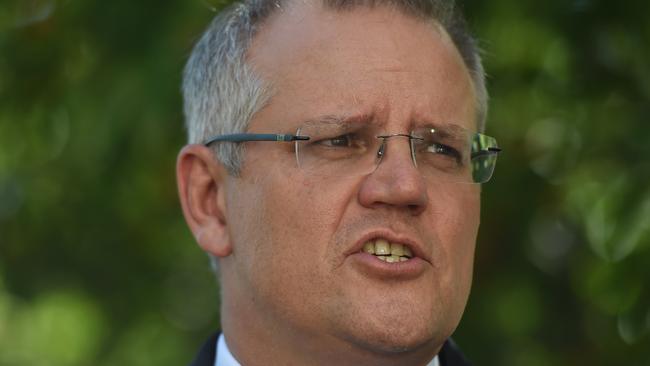Australian economy marks worst performance since global financial crisis
THE economy is officially in the doldrums, with data painting a grim picture for the government’s “jobs and growth” agenda.

THE Australian economy is officially in the doldrums, with the latest data revealing its worst quarterly performance since the global financial crisis.
Treasurer Scott Morrison seized upon the national accounts figures, released today, to demand support for the government’s economic reforms, such as the long-term cuts to corporate taxes it proposed in the Federal Budget.
“We want to pass that through the Parliament and we need the consensus of a parliament that is going to work in the national interest to drive jobs and growth,” Mr Morrison told reporters in Canberra.
“The reason you put out a 10-year trajectory on tax like the UK has or New Zealand has or indeed the United States wishes to, is to signal to investors what the future will be for their investments … That is why I say to the Parliament, in the national interest, this is important for people’s jobs.”
The national accounts showed economic growth declined 0.5 per cent in the September quarter, dragging the annual growth rate down to 1.8 per cent, explaining the subdued employment growth of recent months.
Annual growth in the June quarter was previously reported at 3.3 per cent before revisions.
It was the first contraction in growth since March 2011, and only the fourth quarter in the past 25 years that the economy has contracted — leading some to question the success of the Coalition’s “jobs and growth” strategy.
But Mr Morrison slammed the “cynical politics” of “business bashing” and defended the government’s economic record.
“We have been successful in passing $21 billion in measures that have improved the Budget since the last election,” Mr Morrison said, vowing to work with members of the crossbench to secure “pragmatic” wins.
“If I had taken a poll four months ago, I don’t think people would have thought that would have been achieved … Today’s data suggests that we have got to take that up a notch.”
JOBS AND GROWTH ‘JUST A SLOGAN’
Shadow treasurer Chris Bowen said the figures showed the Coalition government didn’t have a plan, just a “jobs and growth” slogan.
“It is true that quarterly figures do bounce around and we would hope and trust that next quarter’s figures are much stronger after this very low base, but the fact of the matter is that this is a deeply concerning result,” Mr Bowen told reporters in Sydney.
Earlier, Prime Minister Malcolm Turnbull insisted his government was doing all it could to promote growth in the face of big global headwinds.
“We have sluggish growth across the world at the moment and that is one of the reasons why everything we do, every element of our policy has to promote economic growth,” he told reporters in Sydney.
The last time the economy contracted, in 2011, it was the result of adverse weather events domestically and earthquakes in neighbouring New Zealand and Japan, Australia’s second-largest trading partner.
At this stage, economists doubt the economy will remain so weak in the December quarter as to fall into recession — defined as two consecutive quarters of negative growth — pointing to indicators like retail spending, which has picked up in recent months.
The Reserve Bank left the cash rate unchanged at a record low 1.5 per cent at its final board meeting of the year on Tuesday.
Central bank governor Philip Lowe anticipated some slowing in economic growth by year-end “before it picks up again”, pointing to a future pick-up in exports as completed resource projects come on line.
Treasury will use the national accounts to form its forecasts for the midyear budget review, which Mr Morrison will hand down on December 19.
— with AAP




